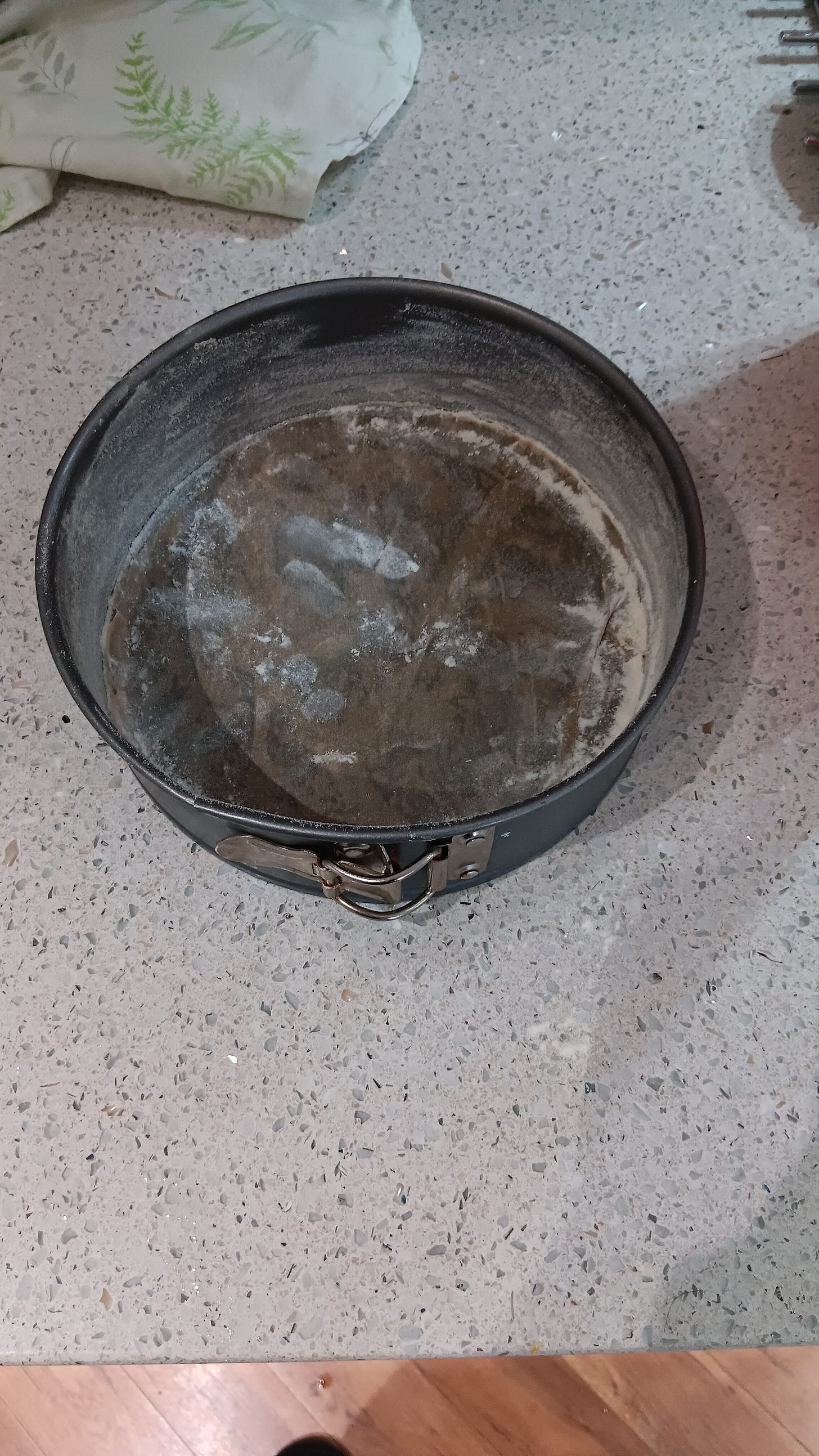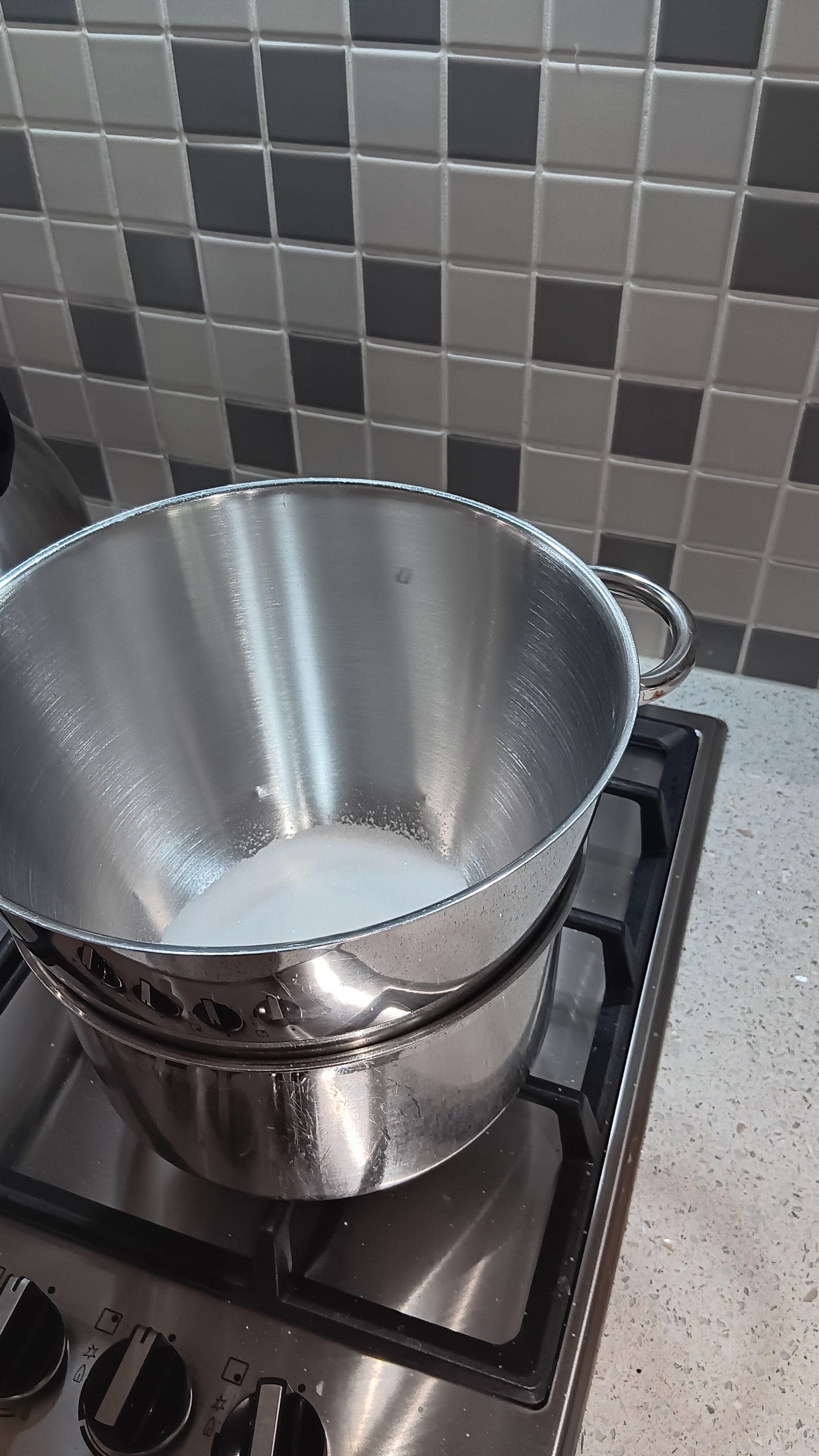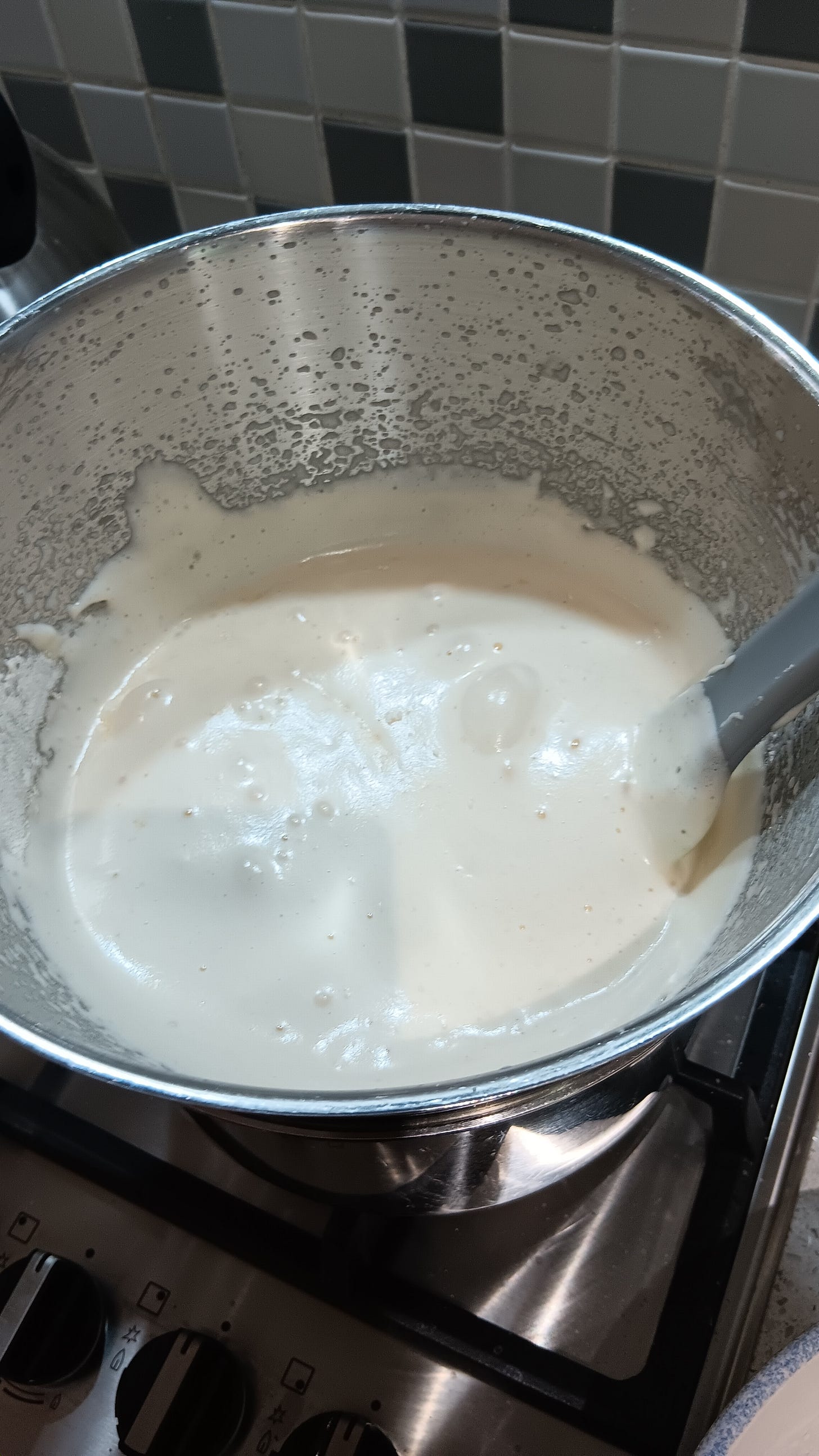June Newletter
A report from trialling the 'genoise' micromastery and a suggestion for beginning to micromaster the virtue of self reliance.
Field Testing the Genoise making Micromastery
For someone who gets a bit anxious when keeping several plates spinning at the same time, it was well worth reading the instructions and recipe the whole way through first. I was able to pre-prepare some ingredients such as sifting the flour, though as it happened, sifting proved easier than anticipated.
A pre-lined pan seemed worth doing before starting the process
The Bain Marie was a possibility as I had a socket for the hand mixer close enough to the gas hob. I borrowed a metal mixing bowl from my wife’s big mixer and put it in a pan with water in it. I’m not sure if the bottom of the bowl was touching the bottom of the pan (something the instructions said to avoid) or even if using the Bain Marie made any material difference to the cake. Things to investigate next time.
The Bain Marie
It was quite easy for a complete novice to whisk the eggs and sugar to the correct consistency. I was surprised that I could ‘see’ the phase change in the mixture, though still felt the urge to confirm it with the ‘ribbon test’. The one thing I missed out at this stage was a final whisking of the mixture after it had been removed from the Bain Marie that is meant to ensure cooling. Having said that, I am unsure of how hot the mixture actually got. So, having a thermometer to hand next time will allow me to start monitoring these two aspects of warming up and cooling. The one big unknown for me is not knowing how long this mixture would stay aerated for before it starts to collapse and was definitely an element in pushing the process forward or in simple terms – rushing a bit!
The folding in of the flour and melted butter is meant to be gentle so as to avoid the aeriated mix collapsing. But how gentle? I think I can be gentle – I was a dad who changed nappies when the children were little, and I can gently pare small slithers of wood with a chisel. But this is a new context for me, and I am not sure if I was gentle enough. The familiar problem of ‘transfer.’ Some big bubbles did arise in the mixture which I am assuming are not a good sign. This is where I need to ask an expert or carefully watch some videos of people performing the action. One tip I got off my wife was that I would have been better using a thin metal spatula.
Mixing the ingredients - are those bubbles a sign of being a bit too rough?
The final big error that I made was that the oven was not preheated to the correct temperature.
We have a new oven and with unfamiliarity with it, I misread the temperature dial. I spotted it after it had been in in the oven for about 10 minutes and thought that the only way to correct the error and save the cake was to leave it in the oven for an extra five or six minutes.
The Result
My wife, an experienced cook, thought it was good enough to actually go ahead and make a tiramisu for desert for a guest who was coming. I was after brutally honest feedback but am not sure if she was being somewhat kind. The rest of the tiramisu was made by her, with me just watching and making some notes for future reference. She thought that she had slightly overmixed the cream caster sugar and mascarpone mix but, that it was good enough. Experienced as she is, it was interesting to see that she was still monitoring her performance objectively.
As a micromastery, how did it go? Yes, it seems worth pursuing as a discrete skill for a bit longer. I have identified things to play with and explore, and the payoff is there. At some point I can let it go and move onto micromastering the creamy bit.
The virtue of Self Reliance
My co-conspirator and I were driving in his van towards our mission…
“The thing you have to remember is, who would be doing this if we weren’t?” he announced. This seemed a good point. In our case, nobody, as far as we knew…
Now of course, in this conversation there was an element of both of us, engaged in a bit of self-elevation. The reality also included the more prosaic facts that our mission was to simply drive to a local golf course and ask them if we could look on the green to check if some rare trees that marked on an old survey were still there.
Later, the conversation reminded me of a mantra associated with this area of virtue
– ‘If not me, then who?’
Like any aphorism, it is a perspective and has its uses and limitations. But asking the question seemed be an entry point to a micromastery approach to the virtue of self-reliance and it prompted some contemplation around the subject.
If I can take you back to the very first micromastery newsletter, self-reliance was described simply as something like a personal, more well calibrated point between conformity and narcissism in our ability to co-operate socially. In a sense, it is finding answers to the problem of being both an individual and at the same time part of a whole. And then we can add to that, the assertion that self-reliance is about building a capacity that allows us to operate in a different way to our usual possibilities of over-conformity and reliance on a group on the one hand, and excessive individuality on the other.
So, exploring responsibility could be an entry trick into exploring how much of our individual responsibility we have ‘outsourced’ to the various groups we participate in. This type of thinking seems to be exemplified by the saying ‘Somebody should…’ Or on the other hand, how much we focus on our own needs or our possibly inflated sense of self-importance.
So, we have one entry point with some common-sense boundaries– whenever you see something that needs doing you can ask yourself if you are the one who needs to do it.
Experimental Possibilities – You can narrow the focus down further if you find it useful.
· If someone asks you to do something, if you have the capacity and opportunity, say yes.
· Simply keep promises.
· Stop blaming others when things go wrong – own your mistakes and rectify them if necessary.
· Take responsibility for allocating your time and managing your energy or learning. If you have tried some of the suggestions in previous newsletters, you may have found that these can be challenging.
· Embark on small adventures or explorations that entail an element of self- reliance.
· Ask simple yet honest questions without regard for what people think of you. This is quite useful for exploring conforming with social normative demands!.
· Consider your responsibility to the future. This doesn’t have to be grand in scale. Recently, we had some carpenters remodelling our kitchen and they were justifiably criticising the actions of those who had installed the units. They had used a shortcut of putting screws with the heads into the wall and pushing the carcases onto them. This made it very difficult to remove the carcases without damaging them. Just after this I was fitting some decking and remembered this and made a small extra effort not to over force the screws into the timber. Whilst it was nice to think that someone in the future might appreciate the effort, in reality the effect is more prosaically practical. I was the first person to have to unscrew some planks when I had to make some alterations underneath.
As there are a lot of entry points here, some could later become experimental possibilities.
Rub pat barriers
Before trying an entry trick take a look at your current responsibilities in the round. Some people have more than enough from their work or family, or both at times in their lives. There is no point in adding more – though you may be able to experiment with and evaluate some that you already have. An over burden of responsibility/ self-reliance can cause some of the disabling states of mind that the exercise is trying to out manoeuvre! Also, if you have a ‘big’ responsibility, for example, it can be easy to become quite trivial. The counter to this is to take responsibility that you consider beneath you. Many years ago, I worked in a laboratory where the chief scientists served Christmas dinner to the rest of the staff. You could of course choose to do this type of activity more frequently and less publicly and seeing what effect that has.
So as far as we knew, there is no one else interested in our collective mission. In this instance the mantra was valid. However, if there are people queuing up to do something, would there be as much virtue in duplicating the effort, particularly if the available others are more effective?
Whilst it can be gamified by making it a bit of an adventure, it can be easy for exploring in this field for the adventure to become somewhat grandiose, to take the heroic story too far. It can become a form of ‘toxic altruism’ and or obsessive. So, it can be important to keep it light. To return to our little group of ‘conspirators’, we are a small group of people who have got together with the aim of preserving native Black Poplars in the county. We keep it light by keeping it loose; there is no investment in a constitution, formal roles, meetings and minutes, or property that could become a psychological sunk cost for us to maintain. The scale is limited. We are quite grounded people and know how to balance this activity with our other roles and interests.
Keeping the micromasteries small and reasonable minimises ‘damage’ from adversarial people taking advantage of your actions and the need to overthink the consequences of your actions. Regarding this last point, and as mentioned in the micromastery for courage via generosity, remember you are in the practice context of learning. For example, some of us in our group are not entirely sure of the benefits of preserving pure native poplars. Ultimately, in the long term their future is likely to be hybrid offspring as they hybridise with all the other poplars which have been introduced into the country.
Things to become aware of when micromastering
Are you becoming more aware of responsibility’s deeper contours and limitations? Consideration of capacity seems connected to the notion of zones of influence. Without splitting philosophical hairs here, I would describe it as the realisation that comes from experience that we have limitations on what we can and can’t influence.
One area to monitor could be what are those limits for you personally and whether you could you possibly expand them bit by bit. This may also generate more entry points to micromastering these virtues. There are obvious links here with notions of lifelong learning and the polymathic enterprise.
We have been looking at the virtues one at time and there are some limitations in that. First, eventually assessing the need for payoff. As the virtue micromasteries are ways of learning about complicated cause and effect, keeping the score could be widened from personal instrumental thinking to observing what is intrinsically valuable for all concerned. This is to avoid the rub pat barrier of becoming self-inflated because you are doing them. (As you may have spotted creeping in when I thought it would be nice if someone appreciated my efforts in the future.) In effect are you creating flexibility of thought by widening your perspective? Secondly, virtues may well need approaching together to avoid becoming over-focussed on one. Finally, they could well do with consideration of other balancing ideas and dispositions.







